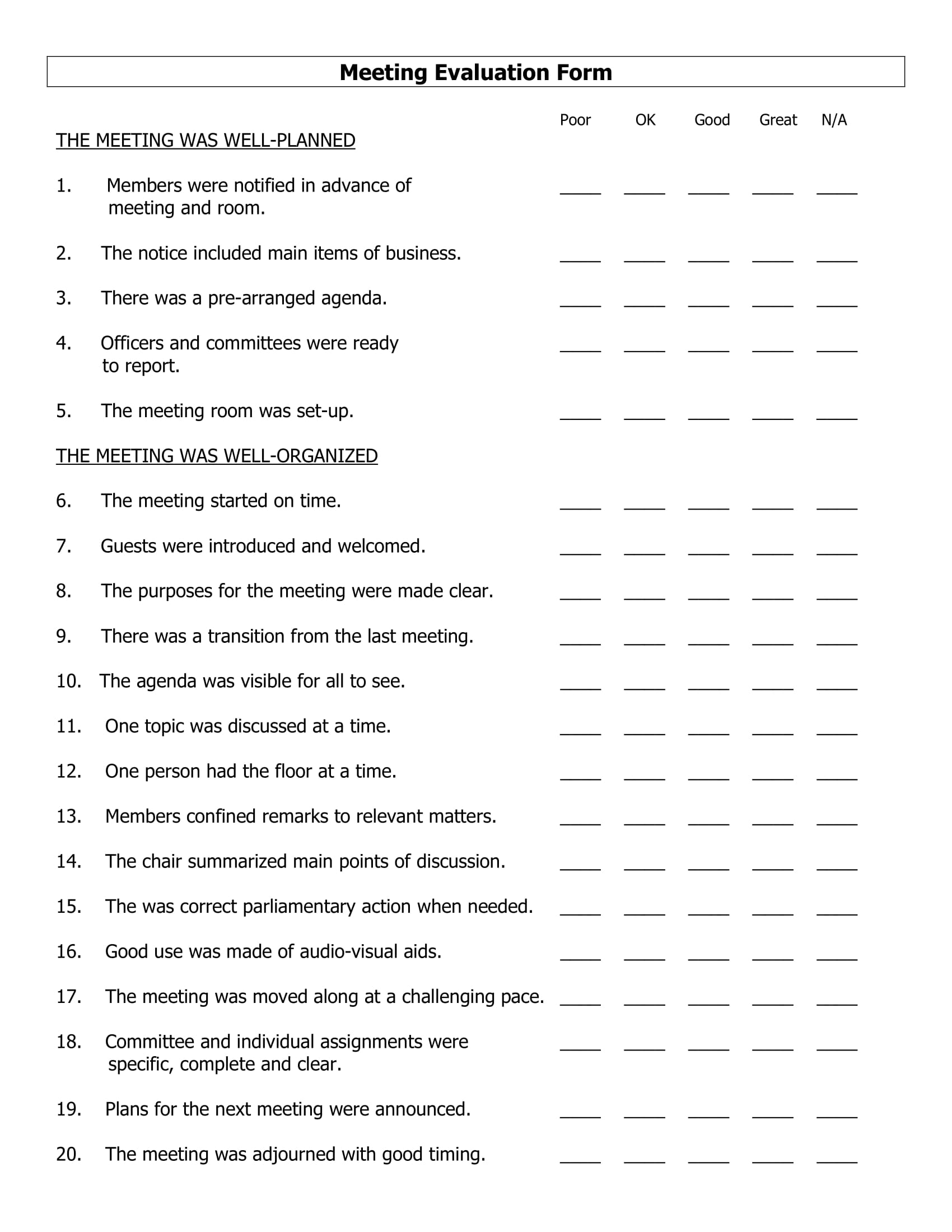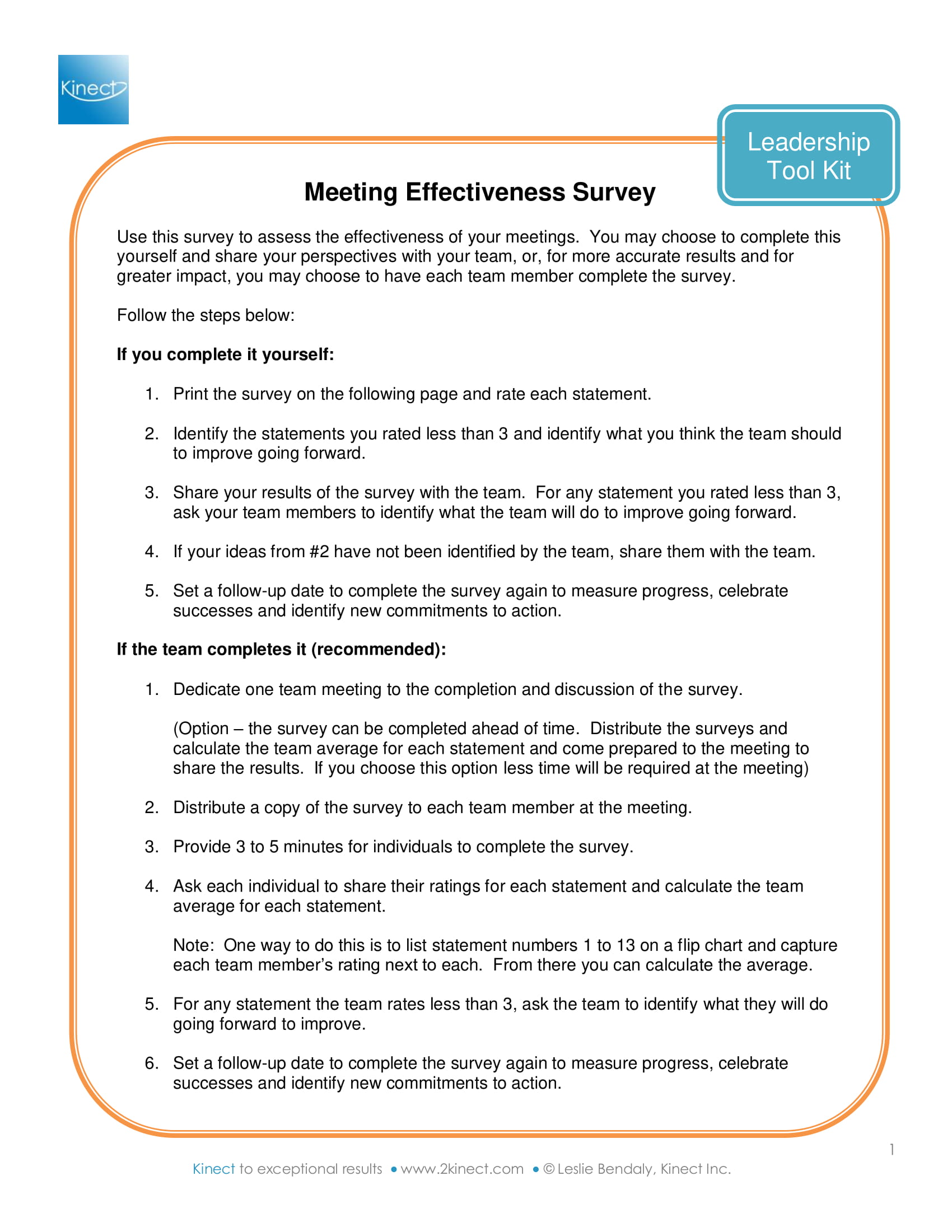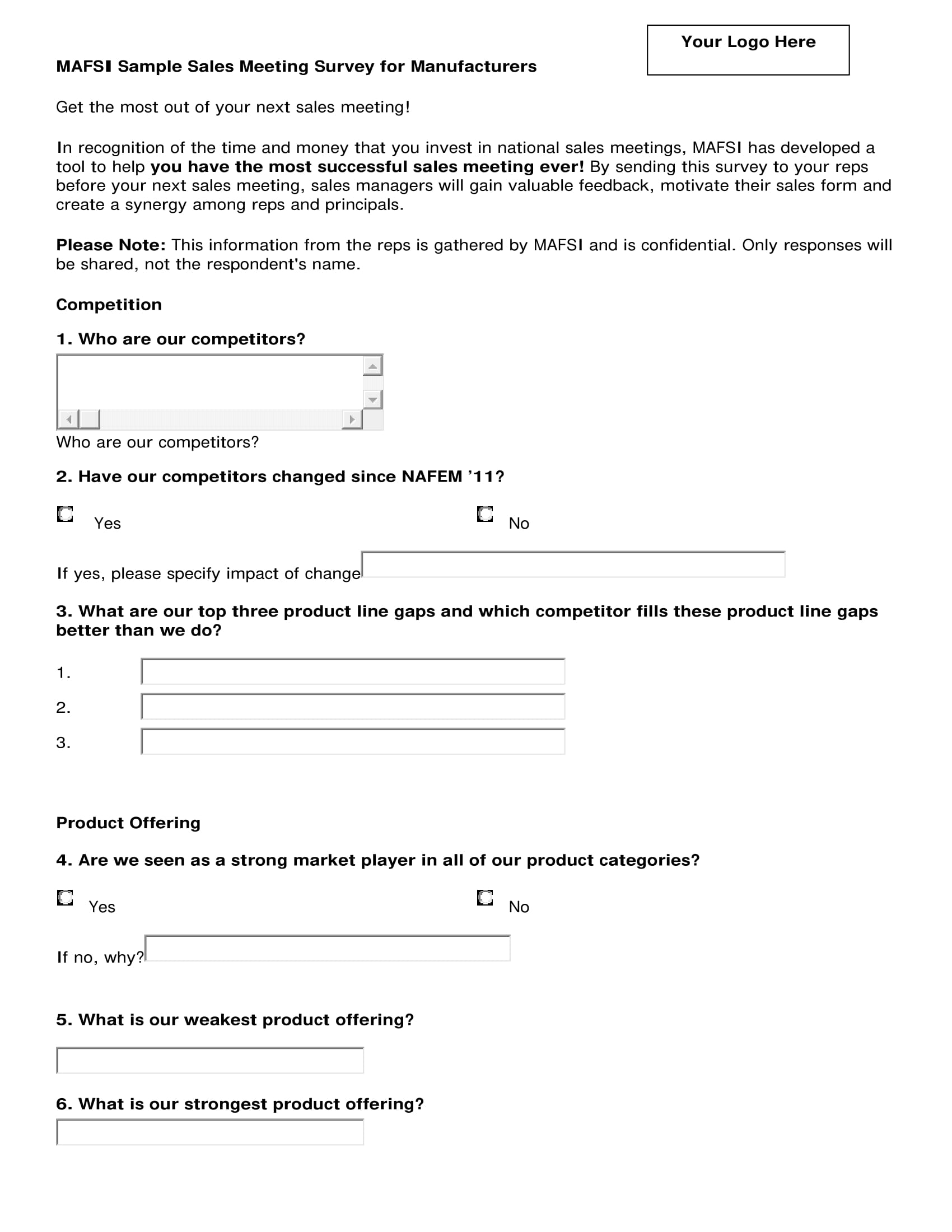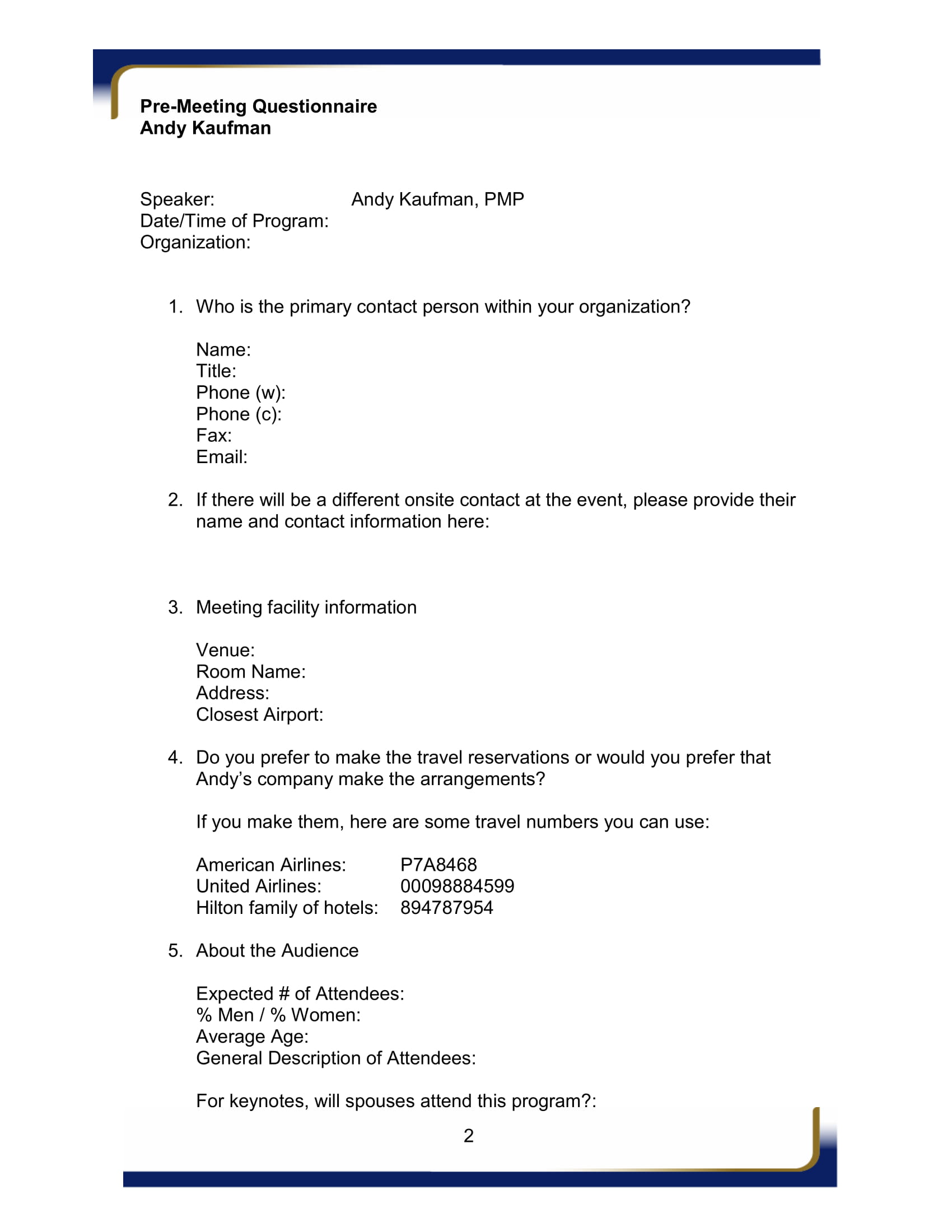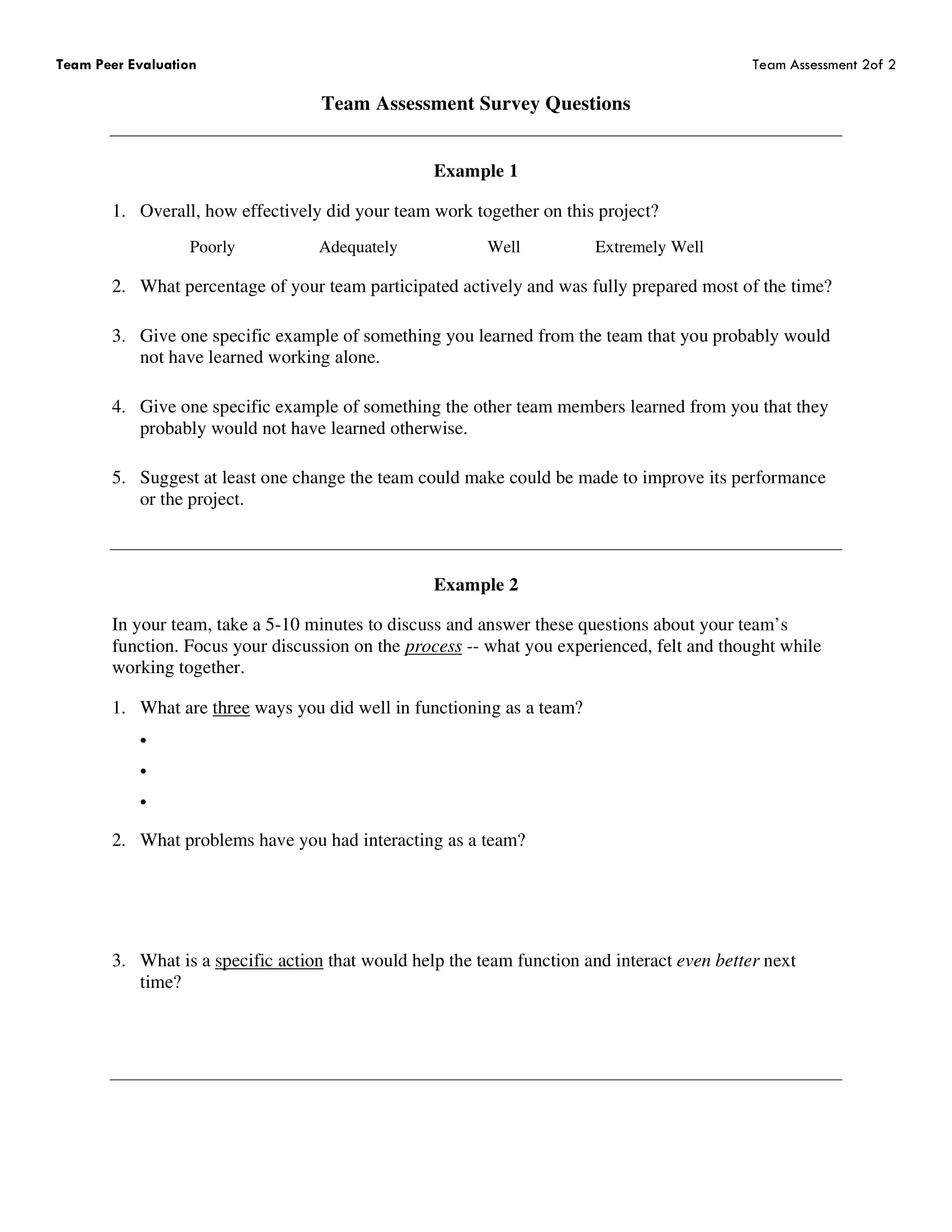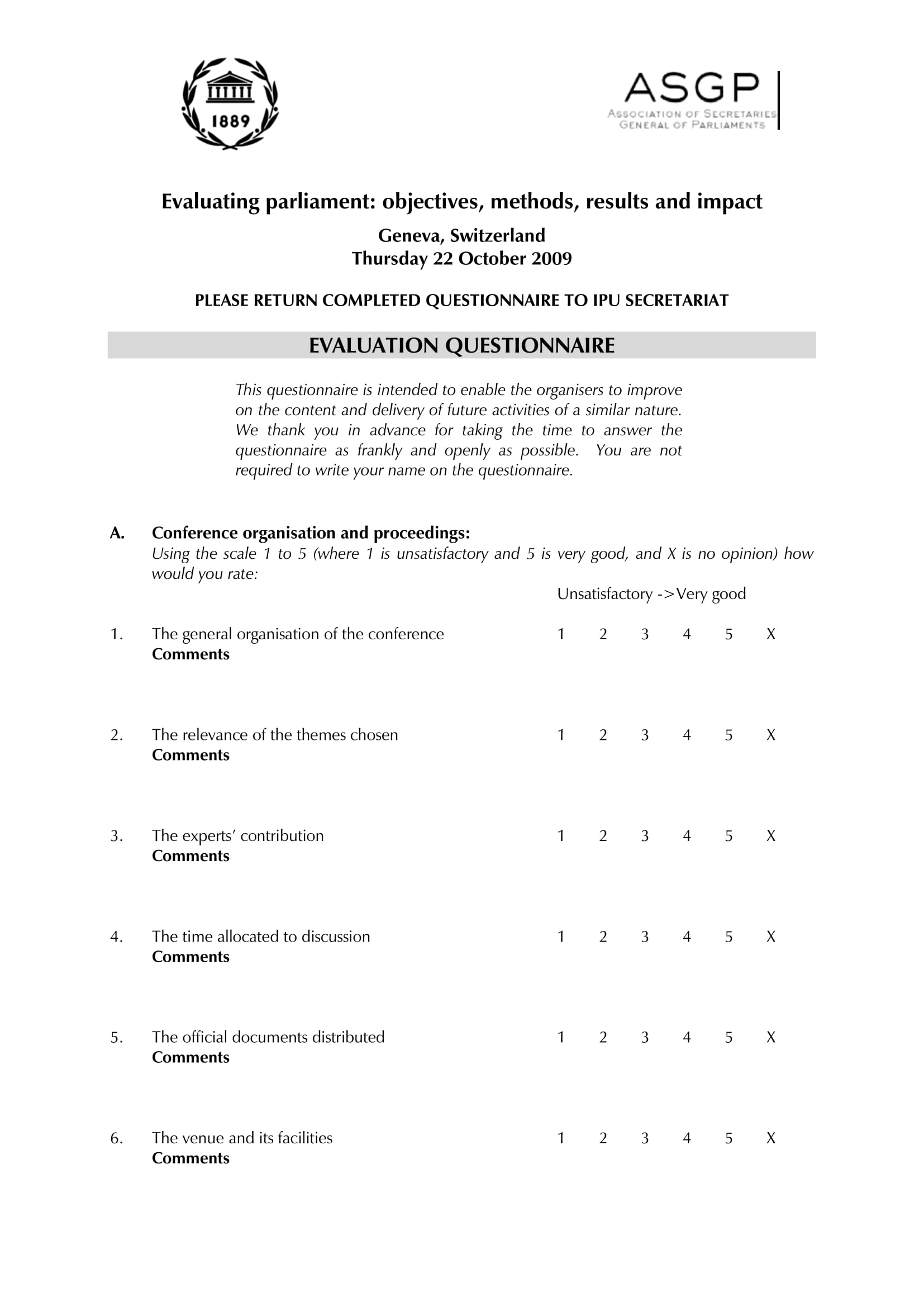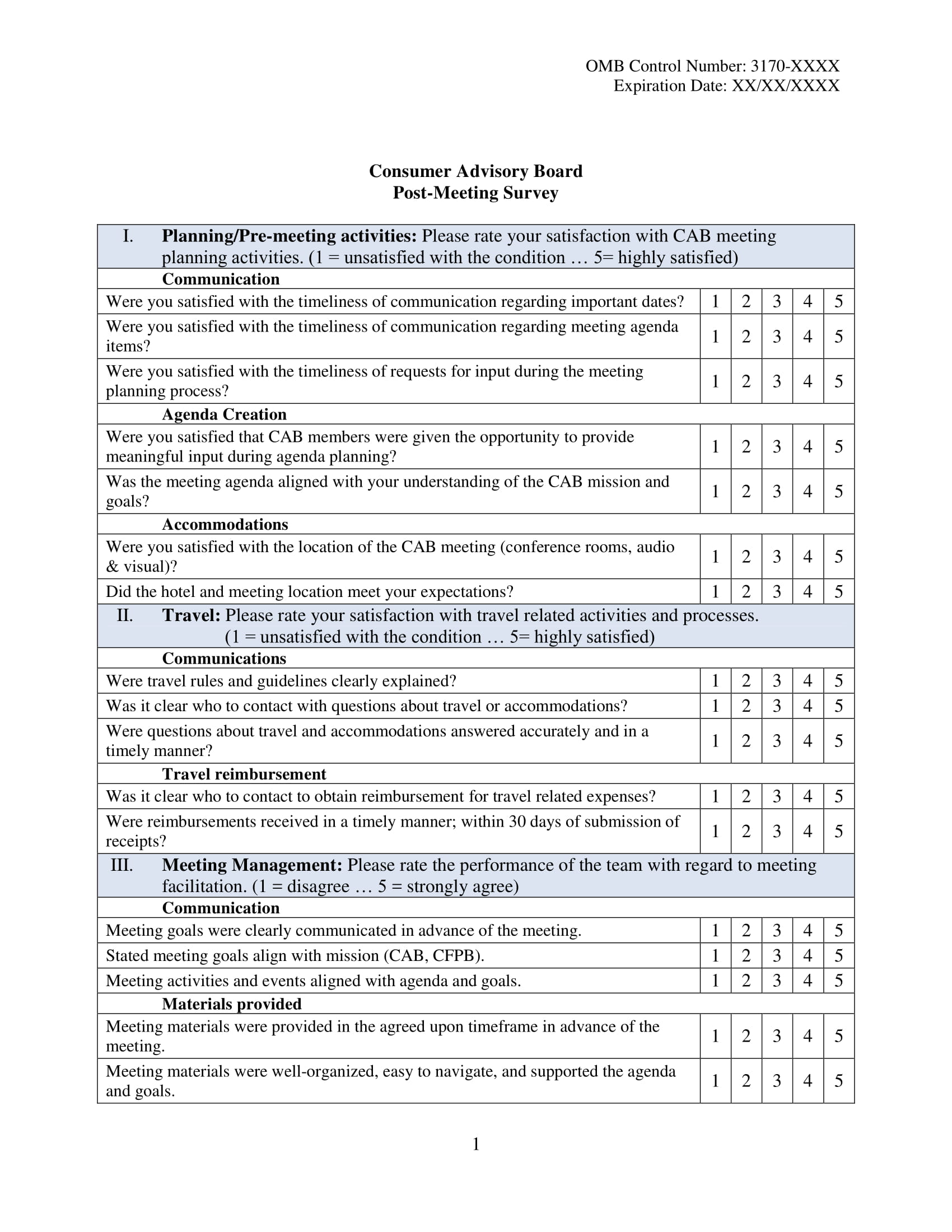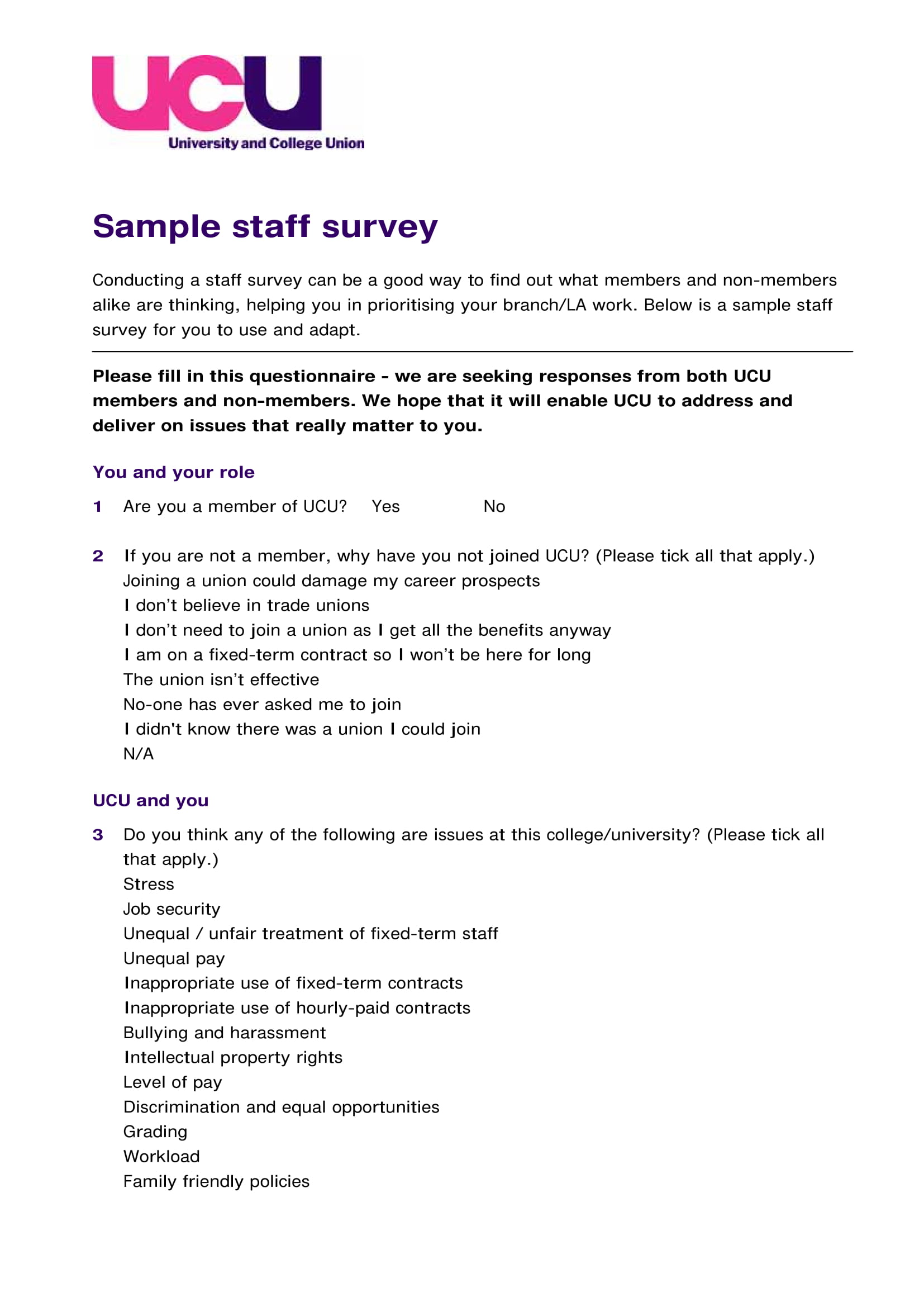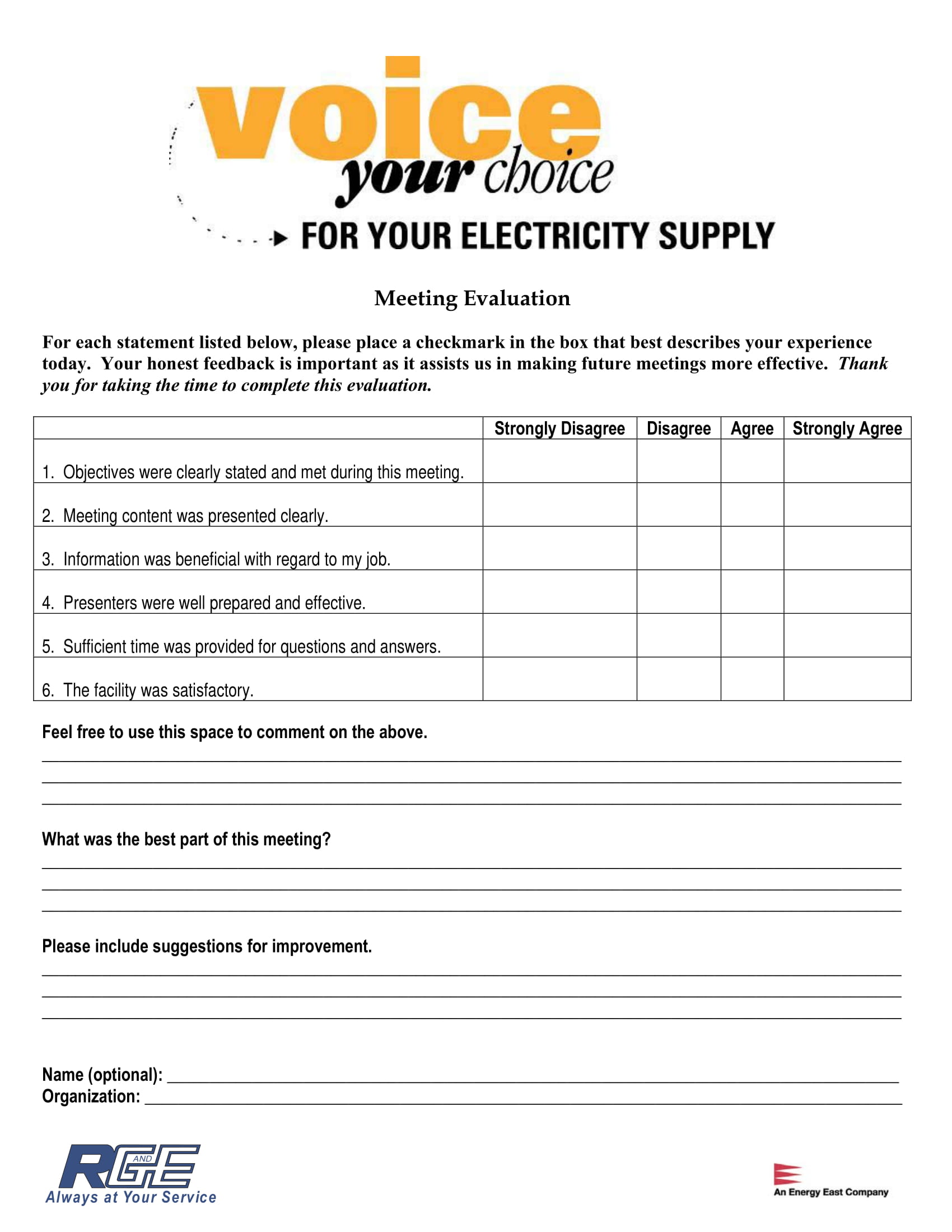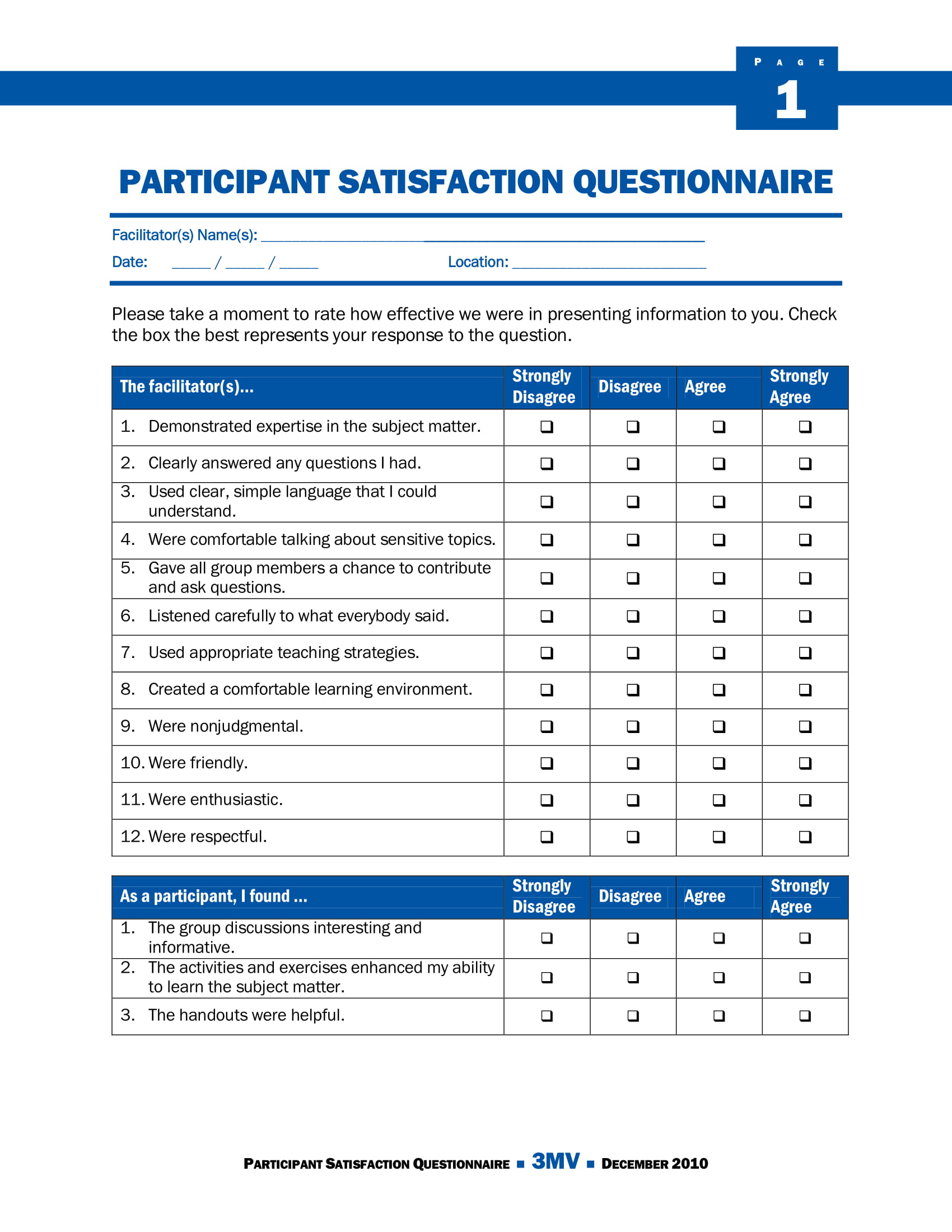Meeting Survey
The whole point of conducting meetings with the people on your team, your whole department, with the management or even with people outside the organization is to get necessary and relevant feedback. Getting feedback helps you find new alternatives to current techniques or strategies and helps you in the overall management and organization of your constituents. A meeting is in fact a very essential part of developing new ideas, reporting significant events, updating progress, strengthening work relationships and keeping everyone united on a single goal. You may also see what is a survey questionnaire?
At some point in your career, especially when you become the head of a team or department, you will have in charge of organizing and/or conducting meetings. These meetings can be about anything, from recognition of effort to reprimanding colleagues that are under you. Whatever may the reason be, it is important in your team or department’s development and improvement which can greatly impact the company or organization as a whole. You may also like survey questionnaire examples.
Meeting Survey Example
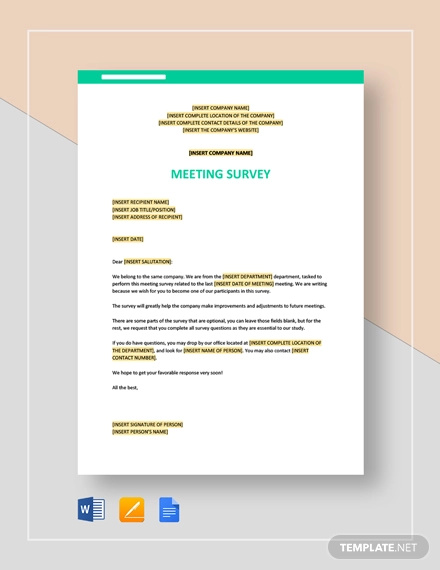
Surveys are one of the ways to assess your progress and development of your business if you are running one. Social Survey Examples templates are generally opinions from people related to your services. According to the responses received from the public, you can make an important decision of your company. So, what are you waiting for? Buy and download this Social Survey Examples template now!
Meeting Evaluation Form Example
Through meetings you can also check on your constituents activities and progress, aside from that, the meeting can be your formal and verbal way of giving off new assignments and challenging your colleagues to strive harder. Meetings have been an integral part of every company or organization; it’s one way of getting stuff done.
Importance of Conducting Meetings
For some, meetings are nothing but a waste of time and resources. Meetings are unnecessary since you can just send an email containing the purpose of your supposed meeting to all the colleagues involved. But setting up and conducting a meeting is more than that. Here are some reasons why conducing a meeting is much more preferred:

1. To provide information
Some companies or organizations often hold regular meetings for their departments and employees. The main purpose of a meeting is to disseminate information in order to unify all employees on the same goal for the entire week, month, quarter, etc. However, these meetings are usually dreaded because even when there is no information to relay, meetings are still conducted. You may also see health questionnaire examples.
An unplanned meeting is conducted as a brainstorming activity wherein all participants are encouraged to voice out ideas on how to solve a problem or how to start a certain project. Through a brainstorming meeting, ideas are taken and used to come up with a unified output which is then relayed as the key point of a particular subject.
2. To create a system for decision making
For example, a strategic meeting is intended to come up with major decisions for companies or organizations. Meetings are generally intended to develop goals and directions for the whole company, department, team, etc. This means that through meetings the people in charge want participants to pitch in ideas and strategies in order to accomplish a goal or task. Through this, the majority can have a say on what decision they think is best to take. You may also like how to develop survey questions.
3. To allow feedback and discussion
Meetings are also conducted to allow and gather useful feedback from the participants about a certain decision made, an action taken, a project to be implemented or has been implemented. Not only that, through meetings there can be discussions on how to improve, develop and handle each tasks better. You may also check out student questionnaire examples.
Meeting Effectiveness Survey Example
Sales Survey for Manufacturers Example
Types of Meetings
Before you even plan a meeting, you must first understand the definition of each types of meeting– what their purposes are and how do they differ from each other in order to conduct an effective and successful meeting. Here are some types of meetings that you will be conducting or probably have been involved before.
1. Status Update Meeting
As the name would suggest, a status update meeting is where the main goal is to align teams assigned on a particular project or task through updates on progress, posting new challenges and giving the next step to take. This type of meeting is the most common one that is regularly conducted in companies or organizations. This type of meeting also includes regular team and project meetings. Group activities such as decision making, problem solving, prioritization and task assignment are commonly found in a status update meeting. You may also see research survey examples.
2. Information Sharing Meeting
This type of meeting is where the main goal is to disseminate and provide information such as presentations, panel debates, keynotes and lectures. As mentioned, the key purpose of this meeting is for the speaker to share useful and important information to the attendees. The information shared can range from upcoming changes, new products and techniques, or an in depth lecture about a subject matter. Tools like slides and videos are commonly used in this meeting in order to make the disseminated information easier to remember. You may also like questionnaire examples in pdf.
3. Decision Making Meeting
Most decisions carried out by a either team or a whole department are derived from decision making meetings. When there is a need to make big decisions, meetings are usually conducted with the team leader, department head, chairman of the board, and others who hold big positions in a company or organization. The main goal of a decision making meeting is literally to make a decision that best matches the situation with the consensus of everyone involved. You may also check out survey questions to ask your customers.
Processes like information gathering, information sharing, brainstorming solutions, evaluating options, ranking preferences and voting are the usual group decision processes that are involved in this type of meeting.
4. Problem Solving Meeting
This type of meeting is perhaps the most complex and varied. This meeting is most commonly conducted to address a certain problem or to focus on creating strategies and plans to direct the future. The scope and priorities should be laid out and defined in order to help the group focus on the most important issue to address so an effective solution can be made. The main goal is figure out a foolproof way of solving issues and moving forward. As mentioned, scopes and priorities need to be defined, opportunities and threats need to be identified, and possible solutions should be deliberated, evaluated, voted and agreed upon by the majority.
5. Innovation Meeting
Meetings that aim attendees to think outside the box are part of innovation and creative meetings. Innovation meetings urge attendees to come up with various techniques for innovation and development through brainstorming, associating, and sharing ideas in a broad scope. The outcome of this meeting can then be used by the attendees to aid their needs whether to solve a problem or to strategize on new tasks or projects. You might be interested in survey examples.
6. Team Building Meeting
This meeting is all about building teams and strengthening relationships. Ultimately, that should be the goal of all meetings, however, team building activities should be the main focus of this type of meeting. The attendees should feel like they belong to a unit, team, department, branch, or company in order for them to understand their greater purpose, thus improving their productivity, engagement, performance, and satisfaction. You may also see income questionnaire examples & samples.
Pre-Meeting Questionnaire Example
Team Assessment Survey Questions Example
Parliamentary Conference Evaluation Questionnaire Example
Consumer Advisory Board Post-Meeting Survey Example
Why Conduct Meeting Surveys?
It is important to conduct pre-meeting and post-meeting surveys in order to gather information about the attendees’ expectations and to gather feedback afterwards. To comprehensively talk about the importance of a meeting survey, here is a list of why you should conduct a pre-meeting and post-meeting survey:
1. Benefits of a Pre-Meeting Survey
- Gauge attendees’ expectations from the meeting;
- Gather pertinent information about the attendees;
- For the organizers to get to know the attendees,
- Gain new ideas for future meetings.
You may also see how to write a survey questionnaire.
2. Benefits of a Post-Meeting Survey
- Collect feedback from the attendees;
- Create future business and marketing strategies;
- Gather information about meeting effectiveness;
- Find out if expectations were met, needs were given, etc.,
- Find out attendees’ satisfaction with the meeting.
Types of Meeting Survey
There are various types of meetings therefore there are also various types of meeting surveys that cater every need during a survey. Listed below are the most common types of meeting surveys:
1. Meeting Evaluation Survey
This survey evaluates meetings as a whole. The focus of this type of survey is to review and analyze the meeting’s organization and contents. There are four general sections to this survey– general aspects, logistics and organization, contents, and suggestions. You may also see examples of self-administered questionnaire & samples.
2. Sales Meeting Survey
As the name would suggest, it surveys the sales activity of a company or organization. Aside from measuring the increase or decrease in sales, it also helps the sales team deliberate what ideas are better implemented to help the company or organization. This survey is usually conducted at the end of a certain month or quarter.
3. Team Meeting Satisfaction Survey
To help evaluate team members or employees satisfaction in the company or organization, a team meeting satisfaction survey is conducted. This will help the management gain insight on the problems, complaints, thoughts, etc. about the team management or department processes. This can help in restructuring current policies or rules to help employees improve their performance and productivity. You may also like marketing questionnaire examples & samples.
4. Annual General Meeting Survey
The term “annual” is the hint for this survey; a survey that is only given during a meeting held only once a year. This will help gather inquiries, suggestions, and other complaints your employees may have.
5. Consumer Advisory Committee Meeting Survey
This survey will help recommendations about consumer issues that they may have within their jurisdiction. As the consumer advisory committee air out the consumers’ concern before the commission, the survey is their way of gathering the consumers’ feedback, thought, suggestions, concerns, complaints, etc. You may also check out marketing research questionnaire examples & samples.
6. Meeting Quality Survey
The overall goal of this survey is to evaluate how the meeting was conducted, how it went, know if was conducted smoothly as its supposed to. Basically, this survey aims to find out about the quality of how the meeting was held.
7. Council Meeting Survey
This survey evaluates council members regarding their council meetings. The meeting aims to answer the following questions: Was the meeting effective and successful? Were the agendas met and thoroughly discussed?
8. Post Meeting Survey Template
To evaluate the whole meeting after it is conducted, a post meeting survey is given to the attendees. This is survey aims to gather feedback regarding the meeting – was the expected topic discussed? Were the expectations met? This will help organizers gain new ideas for future meetings. You might be interested in survey examples in word.
9. Plenary Meeting Survey
Conferences in which all members of all parties are mandated to attend are called plenary meetings. This survey helps gather information about the discussion and the method used in discussing the subject.
10. Meeting Effectiveness Survey
This survey can help measure the effectiveness of your meetings and can help uncover underlying issues of your employees. The result of this survey can then be used to make well-informed decisions that will be of a big benefit to the company or organization as a whole. You may also see sports questionnaire examples & samples.
Staff Survey Example
Meeting Evaluation Form Example
Participant Satisfaction Survey Example
Community Meeting Feedback Survey Results Example
Meeting Survey Design
In order to have high response rate and maximum number of participants in the survey, your survey must conform to this criteria:
- Keep your meeting survey concise
- Encourage thoughtful responses
- Provide feedback on content and process
- Gather feedback on group’s effectiveness
-
Allow all participants to surface their greatest area of concern
-
Vary the feedback your evaluation seeks from the group
-
Feedback about the leader’s behavior in meetings
You may also see restaurant questionnaire examples & samples.
How to Survey Meeting Attendees
As you know there can be a hundred different ways or surveying the attendees of your meeting. Aside from giving the survey immediately after the meeting is adjourned, another way is to send the survey form through an email. Just make sure you get high response on your survey so that the data you get is quantifiable or measurable. To help you with that, here are some techniques in evaluating or surveying your meeting attendees:
1. Rank the efficiency of the meeting on a scale
Interpret this as literal as it can be. Present a scale on your survey form and let your attendees rate the efficiency of your meeting. For example, one (1) being the lowest and five (5) being the highest. The attendees can rate how productive the meeting was or how satisfied were they with the overall meeting. You may also like how to write the perfect survey.
2. Detail the most and the least valuable components
Let the attendees state or identify what part or aspects of the meeting they liked and what they did not like. You can also let them state what methods worked best for them and what didn’t. You can do this through an open format which will let them highlight the specific items that they feel worked best for them. You may also check out how to design a marketing survey.
3. Rank individual factors of the meeting
You can also let the attendees rank individual factors of the meeting. Through a ranking scale find out if they felt engaged, felt that time was used efficiently, if the setting was conducive in meeting the goals of the meeting and if the location was convenient for them. You might be interested in examples on how to conduct a business survey.
4. Reflect on the meeting and tasks
You can also include questions that will allow the attendees to retrospect. This will provide an opportunity to see where or what aspects you can improve on your next meeting. You can ask questions like “Is there anything you think we could have done differently?” or “What else would you like to do or discuss at our next meeting?”
In conclusion, a survey is great method of accurately getting feedback from the attendees of your meeting. It will help you acquire the information that you need to make decisions, gather new ideas, get feedback and ultimately help you unite your team or department into one goal. You may also see examples of writing a brand awareness survey.



